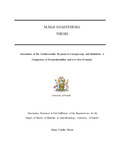Attenuation of The Cardiovascular Response to Laryngoscopy and Intubation
Abstract
Background: Laryngoscopy and intubation are stimuli associated with a transient rise in the heart rate and blood pressure from a sympathetic outflow. Ablation of this sympathetic response would minimize the risks of cardiovascular and/or cerebral events in vulnerable patients. To this end various pharmacological agents have been studied for the attenuation of this response. We set out to compare the effects of fentanyl and dexmedetomidine on the cardiovascular response to laryngoscopy and intubation in our patient population.
Study Objective: This study was designed to compare the attenuation response to laryngoscopy and endotracheal intubation between the two drugs fentanyl and dexmedetomidine.
Study design and site: It was a comparative cross-sectional study. The study population was drawn from adult patients planned for elective non-cardiac surgery under general anaesthesia at the Kenyatta National Hospital, requiring endotracheal intubation.
Materials and methods: We studied 91 consenting adults of ASA class 1 and 2 of either sex. They were studied under one of two arms: Group F (n=45) were those who received a bolus injection of fentanyl 2 μg.kg-1 over 10 minutes before induction of anaesthesia and Group D (n=46) those who received a bolus dose of dexmedetomidine 1 μg.kg-1 over 10 minutes before induction. All patients were induced uniformly using propofol until loss of verbal contact and either atracurium or cisatracurium. Baseline values of the heart rate, systolic, diastolic blood pressures and the mean arterial pressure were measured and recorded prior to administration of the study drug, at the termination of the infusions, during laryngoscopy and tracheal intubation and at minutes 1, 5 and 10 after intubation.
2
Results: Dexmedetomidine at a dose of 1 μg.kg-1 given before induction of anaesthesia significantly prevents an increase in the heart rate from baseline for up to 5 minutes following intubation, compared to fentanyl given at 2 μg.kg-1. The rise in the blood pressure was significantly prevented for up to 10 minutes following intubation.
Conclusion: Dexmedetomidine was superior to fentanyl in attenuating the sympathetic response to laryngoscopy and endotracheal intubation.
Publisher
University of Nairobi
Rights
Attribution-NonCommercial-NoDerivs 3.0 United StatesUsage Rights
http://creativecommons.org/licenses/by-nc-nd/3.0/us/Collections
The following license files are associated with this item:


